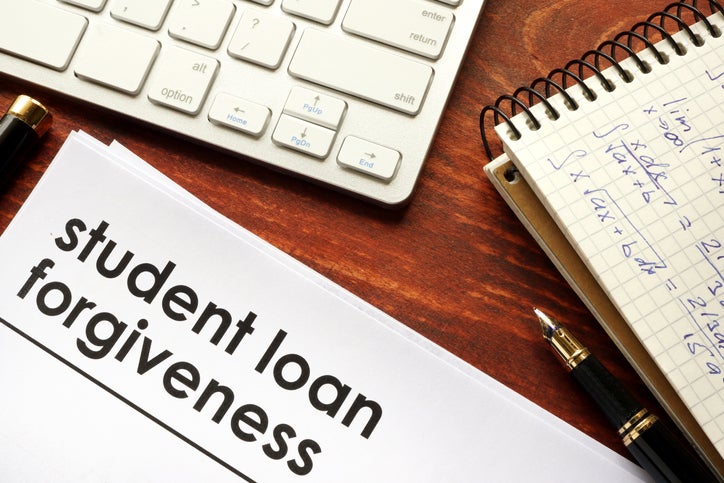The Coronavirus Aid, Relief, and Economic Security (CARES) Act offers multiple forms of economic relief for many people financially affected by the Coronavirus. Federal student loan payments are affected by this act.
The total amount of student debt in the United States during the second quarter of 2019 was $1.48 trillion, according to the Federal Reserve Bank of New York. The total is owed by more than 44 million borrowers.
Although the second-quarter 2019 student loan figure was slightly lower, the average amount that graduating students owe is $37,000, a steep increase from the average $20,000 owed by graduating students in 2005.
Needless to say, student loan support is an important part of any package designed to provide relief from the economic difficulties stemming from the Coronavirus pandemic.
Federal Student Loan Payments and Interest Suspended Through December 31
At Rock House Financial, we see a lot of student loan in our clients’ budgets. This stimulus relief is sure to help a lot of people.
All payments on federal student loans are suspended through administrative forbearance. As of the time of this writing, August 2022, the payment pause is extended until December 31, 2022, according to the Federal Student Aid office.. The accrual of interest on the loans is also to be set at 0 percent through December 31st. Both suspension and 0 percent interest rates are retroactive to March 13, 2020.
It’s important to note that the CARES Act provisions apply only to federal student loans owned by the Department of Education, which are:
- Direct Loans
- Federal Family Education Loans (FFEL) program loans
- Federal Perkins Loans
Student loans owned by private commercial lenders (such as a bank) do not fall under the CARES Act. In addition, some FFEL Program loans are owned by commercial lenders, and thus are not covered by this program. Perkins Loans may be owned by an educational institution. The CARES Act does not apply to any loans owned by an educational institution.
Students or other borrowers whose student loan payments are not covered by the Act, but who are experiencing financial hardship in the pandemic crisis and will have difficulty making payments, should contact their borrowers to discuss the options for reduced payments, forbearance and other potential solutions. Commercial lenders will likely work with borrowers right now who have lost their jobs or suffered related financial hardship.
Because student loan payments can be complex, students or other borrowers who are unsure about the status, owner or originator of their loans should contact their loan servicer for more information. Don’t assume that a loan will be covered by the CARES Act, because penalties and fees for late or missed payments, as well as interest rates, will still be charged if they are not.
These are tough time for sure. Rock House Financial is here for you. Contact us if you’d like to discuss your financial situation.
Suspension Expected to Be Automatic
For those whose student loan payments are covered, lenders are expected to automatically suspend loan payments and interest. (That is, individual borrowers should not have to make arrangements for the suspension themselves.)
If borrowers are making automatic payments, lenders were given until April 10 to actually suspend the payments.
If borrowers either made a loan payment or had an automatic payment made after March 13, and their loan falls under the CARES Act, they can contact the loan servicer for a refund.
No Effect on Borrowers
The provisions of the CARES Act should not result in any negative impact on borrowers of these covered student loan payments. The administrative forbearance will not affect their credit scores, for example, as lack of payments will not be considered the type of action necessary to report to credit agencies. They will be counted as if payments were made.
In addition, the arrangements are flexible. Borrowers who want to make their monthly student loan payments can continue to do so. Borrowers who want to take the 0 percent period as an opportunity to pay down debt faster can continue to make student loan payments – even larger than usual, if they want. Smaller payments can also be made with no penalty.
The administrative forbearance also applies to a number of situations. Borrowers who are 31 days or more past due on their student loan payments will automatically be put in forbearance if their loans are covered and will not be subject to interest. If student borrowers currently in default are having their wages, Social Security checks or tax refunds garnished for payments, those garnishments will be suspended for the entire period. No interest will accrue on these loans.
Public Service Loan Forgiveness
Borrowers who fall under the Public Service Loan Forgiveness (PSLF) program may also be affected. This program forgives student loan debt if the borrower works full-time at an eligible nonprofit or government agency for 10 years. This time of suspension should count toward these 10 years (a total of 120 qualifying payments). Borrowers who are unsure of whether they continue to qualify should contact their lenders.
Make sure to keep records of any communication about your loan, your payment schedule and your non-payments during the CARES Act suspension period.
It remains to be seen if student loan payments made by commercial lenders or held by non-federal sources will fall under a similar forbearance or suspension of interest payments at some point. Congress has indicated that future action on Coronavirus-related financial relief will be forthcoming, but the shape of it isn’t clear.
What Happens After December 31st?
The suspension and 0 percent interest rate period are set to expire on December 31st. Roughly a month before that, borrowers should be contacted by their lenders with reminders that payments are to begin again.
For student loan borrowers, the time is ripe to formulate a financial plan.
For those hurt financially by the Coronavirus pandemic’s effects, it might be a good time to place the money saved on regular student loan payments toward monthly cash flow. However, it might also be a prudent idea to save the money or even invest it. Eventually, the pandemic will end and the economic strain it caused will cease.
Need a hand?
Please subscribe to our newsletter for future updates.
At Rock House Financial, a fee-only financial advisor in Farmington, Utah, we are charitable giving tax mitigation specialists. We work with families, business owners, and individuals who wants to make an impact through giving.
“Have you made your greatest contribution yet?”
Don’t just hope – get the answers you need about how to mitigate taxes and achieve your financial goals.
Disclaimers
The opinions expressed herein are those of the firm and are subject to change without notice. The opinions referenced are as of the date of publication and are subject to change due to changes in the market or economic conditions and may not necessarily come to pass. Any opinions, projections, or forward-looking statements expressed herein are solely those of author, may differ from the views or opinions expressed by other areas of the firm, and are only for general informational purposes as of the date indicated.
Sources
The White House. (24 August, 2022). FACT SHEET: President Biden Announces Student Loan Relief for Borrowers Who Need It Most
https://www.whitehouse.gov/briefing-room/statements-releases/2022/08/24/fact-sheet-president-biden-announces-student-loan-relief-for-borrowers-who-need-it-most/











